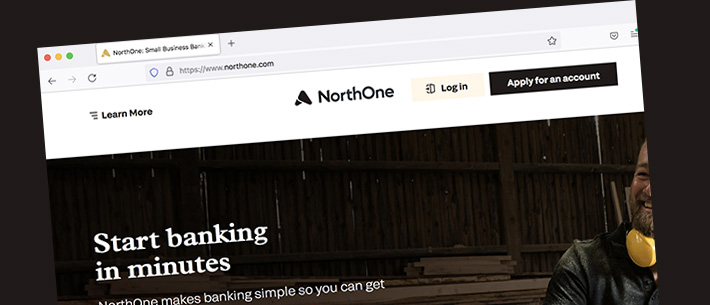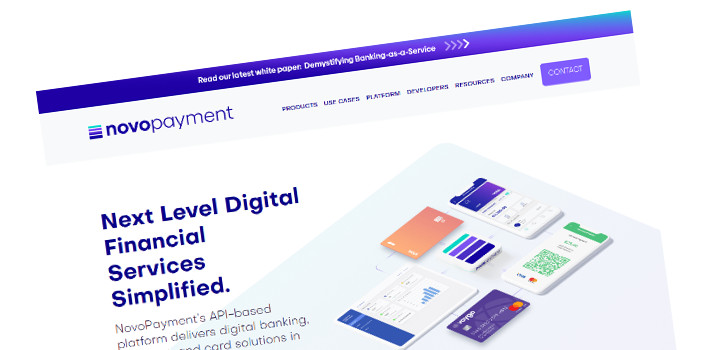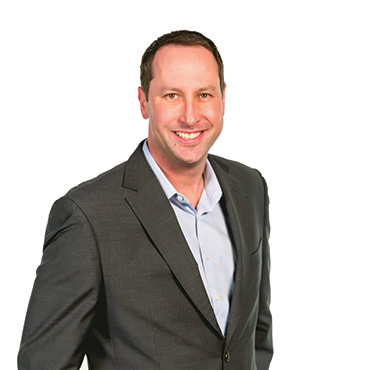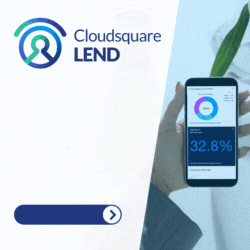Banking
NorthOne is Building Finance Departments For Small Businesses
October 20, 2022 NorthOne recently received $67 million in Series B funding from investors including former NFL star Drew Brees, Battery Ventures, Don Griffith, Ferst Capital Partners, FinTLV, Operator Stack, Redpoint Ventures, Tencent, Tom Williams, and Next Play Capital.
NorthOne recently received $67 million in Series B funding from investors including former NFL star Drew Brees, Battery Ventures, Don Griffith, Ferst Capital Partners, FinTLV, Operator Stack, Redpoint Ventures, Tencent, Tom Williams, and Next Play Capital.
Founded in 2016 by CEO Eytan Bensoussan and COO Justin Adler, NorthOne was designed for small business owners to build a finance department without the complexity of a bank. Coming from an entrepreneurial background, Bensoussan noticed that being a great owner does not make one a great financial manager. With the idea of building good banking and accounting for businesses and combined with Adler’s professional career in the tech space, NorthOne was born.
“We want to build finance departments out of every small business in America, bring the sophistication of what so many of the biggest companies around us enjoy but bring it to the small businesses that could never dream of being able to build a finance department for their small business,” said Bensoussan. “I think that’s the gap that we’re closing.”
Through NorthOne, customers not only get access to a bank account but also technology that organizes and manages other business functions. Business owners can pay invoices, do payroll, and send ACHs or wires in seconds, for example, all while integrating with their existing accounting, e-commerce, and POS software.
Conducting all this from a desk or mobile device without having to go to a bank is a service directed at small businesses with fewer than 10 employees, that are family owned, and are managed locally in the community.
“…here we are talking to a lot of these business owners explaining that there’s so much more that a bank account could offer if it was designed to be more than just a store of money,” said Bensoussan. “I think that’s this eye-opening moment when we talk to them, and we get a lot of folks saying I never even thought that it could go that far. And it’s an exciting moment for us as well.”
Pay Day Just Switched Its Day
October 20, 2022 Direct deposit could soon be hitting some JPMorgan Chase customers’ accounts two days earlier than their regular pay day. A new feature they’re rolling out aims to reduce over drafted checking accounts. In addition to paycheck deposits, it can also be applied to tax refunds, pensions, and government benefits. Such a move is a nod to perks already being offered by fintechs such as Chime and banks as well.
Direct deposit could soon be hitting some JPMorgan Chase customers’ accounts two days earlier than their regular pay day. A new feature they’re rolling out aims to reduce over drafted checking accounts. In addition to paycheck deposits, it can also be applied to tax refunds, pensions, and government benefits. Such a move is a nod to perks already being offered by fintechs such as Chime and banks as well.
The feature will be available for Chase Secure Banking customers starting this week. There is no minimum deposit to get started and there is a monthly service fee of $4.95.
The transition away from overdraft fees is becoming more common. Last year, Capital One announced it was completely removing overdraft fees and non-sufficient fund fees, for example. Following that trend banks such as Discover, Ally, Axos, Betterment, Wealthfront and Alliant have also introduced no-overdraft account options.
Some “pro-overdraft bankers” believe that fees encourage responsible behavior while opponents have criticized a service that charges money to people for not having enough money.
Rapid Finance Has Evolved Into a Three-Piece Business
October 12, 2022 Historically, Rapid Finance has been a lender, but over the last few years the company has expanded into other areas including portfolio servicing and technology. It’s a three-piece business, one that now includes a new wholly owned subsidiary, Thrive.
Historically, Rapid Finance has been a lender, but over the last few years the company has expanded into other areas including portfolio servicing and technology. It’s a three-piece business, one that now includes a new wholly owned subsidiary, Thrive.
Thrive is described as an end-to-end digital lending platform that can be used by banks, credit unions, or other organizations to offer small business loans faster and easier to their customers.
Kunal Sehgal, co-founder and CEO at Thrive, said that Thrive’s technology can handle everything “from the application intake, to actual data collation and aggregation, to underwriting to decisioning, to origination to closing, and then servicing as well.”
The product gives Rapid a unique tool in its arsenal, given the company’s background. Will Tumulty, CEO at Rapid Finance, explained that Thrive’s technology will be greatly enhanced by Rapid’s own experience in the lending business.
“If you want to do a partnership with Rapid [through Thrive], you’re not just signing up for software,” Tumulty told deBanked. “You can get software, you can get potentially balance sheet access, you get expertise in servicing and credit management that Rapid has developed over more than 15 years in small business lending. And we think that’s a big difference for companies that are looking for a partner to help them get into the small business lending space.”
The acquisition was announced on October 3rd at American Banker’s Small Business Banking conference and is part of Rapid’s recent corporate rebrand and restructuring, which includes a new logo and website.
Has That Doc Been Tampered With? Ocrolus Will Detect it
September 20, 2022 Building off its original technology, Ocrolus has added a new fraud detection solution called Detect.
Building off its original technology, Ocrolus has added a new fraud detection solution called Detect.
“Detect uncovers document fraud and provides high-quality, decision-ready data that helps lenders minimize risk and prevent unnecessary losses,” said David Snitkof, Head of Analytics at Ocrolus. “With Detect, we’re able to show lenders when editing software was used, and if things like account number, account holder, dollar amounts, and more have been edited on a document.”
This analysis can be performed through the Ocrolus dashboard or API so that can lenders can review it and make a qualified decision. Tampered areas of a document are highlighted in red.
“In some cases, we’re able to uncover the original document and show it side-by-side with the tampered document,” said Snitkof. “This paints a vivid picture of how fraud is taking place.”
Snitkof believes Detect will be an asset to the company as they have already seen tremendous impact with their customers.
“For a leading small business lender, we were able to identify file tampering on 21% of confirmed fraud losses. Detect would have saved the lender over $1.2 million. That’s a significant return on investment,” said Snitkof.
To be clear, the company had previously provided customers with a fraud detection solution and this is merely a significant update.
“Fraudsters are constantly innovating and developing new techniques to misrepresent the truth and steal lenders’ capital. Even when they manipulate a document, it is often a high-quality forgery, where there would be no way for a human reviewer to identify any inconsistency,” said Snitkof.
Recent occurrences and the increase in fraud have ignited Ocrolus to improve their tools.
“People often take others’ financial documents, modify the information, and pass it off as their own. Sometimes, a fraudster will create cash out of thin air – for instance adding digits to a transaction amount – and then also change all the other numbers on the statement so that all the numbers reconcile perfectly,” said Snitkof.
Is Your Big Brand a Bank? You Can Turn it into One
August 16, 2022
“Any entity that has employees, customers, and fans can create a banking infrastructure that looks just like a bank,” said Yuval Brisker, Co-founder and CEO of Alviere. Founded in 2020 as a spinoff of Brisker’s previous firm, Mezu, Alviere is ringing in the next generation of fintech through its embedded finance solutions.
Brisker wasn’t talking about turning the corner diner into a bank, but rather about providing the infrastructure to enable the largest companies and brands in the US to be one-stop shops for financial services, including banking.
“[It could look] like a bank in every sense,” he said, “FDIC insured, providing a savings account with yield, being able to ultimately give them a credit card, that is not a co-branded credit card, but it’s a single brand…”
Alviere has already spent loads of time dealing with the hard parts, building the tech, but also navigating the regulatory framework to make this concept a reality.
“We are a 100% regulated entity, meaning we’re not piggybacking on a banking license,” Brisker said. “We are actually licensed across the United States in every state that takes a license (except Montana). We are licensed with the federal government in Canada and Quebec and in the English speaking provinces, we’re in the process of completing our licensing in Mexico, and in Europe and in the UK.”
Brisker says this proactive approach is a “big differentiator” against the competition because they really want to provide the full services end-to-end. And that’s a big range given that it spans from bank accounts to payments to cards to cryptocurrency.
 In making this possible, partnerships are key. Alviere has multiple bank partners across the globe, the company claims, one among them being Community Federal Savings Bank in the US. Alviere even solidified a deal with Coinbase back in March that enables brands to provide crypto services to their customers all through their own branded technology.
In making this possible, partnerships are key. Alviere has multiple bank partners across the globe, the company claims, one among them being Community Federal Savings Bank in the US. Alviere even solidified a deal with Coinbase back in March that enables brands to provide crypto services to their customers all through their own branded technology.
Retail customers might not ever know the name Alviere because they remain in the background, Brisker explained. The brands would, but the customers would only see themselves interfacing with the brand, which is basically the whole point.
“We tell [brands] those customers will never be our customers,” Brisker said. “We’re never going to take over the customer relationship.”
Larger companies have probably entertained this whole idea at some point already, according to Brisker. The potential to capitalize on a loyal customer base by trying to offer them financial services is increasingly being looked at.
“If you’re one of those companies and you also look at the same time how difficult it is to get into this business, both from a regulation, an ecosystem, and a technological point of view, then you’re probably putting that on your back burner and saving this for another day,” he said. Alviere, however, can make this a reality right now.
“We have all the contracts, we have all the relationships, you just need to have one point of contact, one API, one relationship, one contract, and that’s us,” Brisker said. “And we take care of everything else.”
But perhaps it’s all a big bet, because would customers actually use financial services offered through non-bank brands that they’re fans of otherwise? Technically, they already are.
When Alviere launched two years ago, more than 1 out of every 2 Americans had already used a Buy-Now-Pay-Later (BNPL) service, an embedded financial concept that’s taken off around the world. BNPL sales amounted to $100 billion in 2021 in the US alone.
“We believe that there’s a huge opportunity for more traditional beloved and essential brands to become the financial service providers for [people] coming of age,” Brisker said. “And then of course there’s a huge unbanked population that for whatever reason has not entered the financial system here and abroad, which we think that through the affinity with sort of less foreboding, less anxiety, stress-ridden relationships like some people have toward banks that they will be more inclined to come into the financial system through the back door of the system, the front door of the brands they already know and patronize.”
NovoPayment, Latina-founded BaaS Plans to Expand
April 21, 2022 Novopayment has raised $19 million in Series A financing, led by Fuel Venture Capital and IDC Ventures. The company, which offers digital banking, payment, and card solutions, is planning to grow and expand within current and further US markets while focusing on countries in Latin America and the Caribbean.
Novopayment has raised $19 million in Series A financing, led by Fuel Venture Capital and IDC Ventures. The company, which offers digital banking, payment, and card solutions, is planning to grow and expand within current and further US markets while focusing on countries in Latin America and the Caribbean.
CEO and Co-founder Anabel Perez stated, “We define a digital payment as the simple transfer of value from one payment account to another using a digital service such as a mobile device, POS, or computer.”
With the new funding, NovoPayment plans to continue increasing capabilities, introduce new features and functionalities, heighten security, and capitalize on US market opportunities. To accelerate their expansion of current offices in Mexico, Colombia, Peru, Ecuador, and headquarters in Miami, they are adding over 100 new engineers, business development, and product experts to their team. Austin and San Francisco are the first two spots where the branching out will begin.
“Austin and San Francisco are huge hubs for tech innovation and we want to expand there to ensure we attract the best talent for our operations,” Perez discussed. “As we grow in those markets, we’ll assess if we need more boots on the ground in additional states.”
NovoPayment currently holds a strong placement in the LAC region and works with several US clients and partners. This places the company in the right position to broaden in these markets they already have successful track records in.
“Based on our ongoing discussions with clients, we have special insight into the challenges and technology gaps these markets face, and realize the potential to further connect the Americas with a common banking infrastructure. We will be growing our product offerings to enable new data and money flow solutions to account for the increasingly globalized, cloud-based world of financial services,” Perez explained.
As Miami is the “Latin America capital of the US,” NovoPayment holds an advantage as a native of South Florida with the tech scene gravitating towards this region. Miami has served as a gateway to other markets.
“Unlike other companies that are now playing catch up and rushing to the LatAm market, we have a strong foothold and reputation in 14 markets across the Americas,” said Perez. “Establishing those relationships, and understanding the nuances of each market, requires regional expertise that takes time to build.”
Empathy in Design, Data in Development; How Specialized Fintechs are Bringing Humanity and Finance Together
March 15, 2022 Ahon Sarkar, GM of Helix
Ahon Sarkar, GM of Helix“I think the idea of being human has to exist at the core of your business. When you’re building a product, you have to start by asking ‘what’s the problem I am trying to solve and who is the person and what are they actually dealing with, and then how do I build it.’ You don’t build something and then bring it out to people. Empathy has to be the core of your product development.”
Ahon Sarkar is the GM of Helix, Q2’s BaaS arm, and a brand new homeowner. According to him, innovation happens when you define products based around problem solving, not creating products and then trying to force them on industries that desire innovation.
“I just finished buying a house, and it’s been a crazy process,” said Sarkar. “When I sent the wire to go buy my house, I went and asked my bank, ‘how will I know it’s been sent?’ Obviously I’m anxious about it,” he continued, “it’s the largest amount of money I have ever sent in my entire life.”
Sarkar said that his bank told him their system doesn’t give notifications that wire funds are indeed sent. The bank was like “‘oh, you won’t know.’ I was like what?”
“That day, I walked out and called our Product Owner for Wires and I said, ‘Kady, we have to build wire notifications.’ That’s empathy. That’s putting yourself in the shoes of the person and figuring out what is wrong with the system and making it better for a human being, as opposed to focusing on just the top line revenue.”
Helix’s whole mantra is about making finance human. By creating specifically tailored products for their clients, the company has developed both a brand and mindset internally and externally about their goals, values, and outlooks on what their work means to the greater good of both levels of consumer and B2B economics.
On top of offering employees complete flexibility on where and how they work, Helix also looks for people who are outside of the ‘cookie cutter’ software guru fintech employees are labeled as. Instead, Sarkar and Helix are looking for genuine human beings with life experiences that they can bring value to both the product and company’s culture.
“It’s hiring people that are empathetic, that are curious and are driven, because that propagates this idea into customer support, into operations and how we work with our bank partners,” said Sarkar. “It goes into marketing and how we’re talking about the overall message, so if it’s not at the core of what you do, at some point it will be pushed to the side so you can do the innovation and revenue you really want to do.”
“We have realized that you can innovate and drive revenue by being empathetic, by being human, and actually entrenching those values within the genetic fabric of the company,” Sarkar said.
When asked about the state of small business lending, Sarkar spoke about the data pools some companies are sitting on that would allow them to approve individuals for financial products. However it’s regulations according to him that are holding companies like Uber back from offering financial products to their employees.
Sarkar pitched the scenario of Uber lending a driver money at a cheaper rate because the information they have on their own employee may be able to prove their creditworthiness more than the information that is accessible to a bank.
“Let’s say you have an Uber driver, who has been on the job for four years. Five star driver, five thousand rides, Uber trusts this person. When that person walks into a bank, what does the bank see? Someone they never met before who makes $35K-$45K a year and comes with a bucket of risk. So that bank is going to run it through traditional underwriting, and that person may be challenged to get a loan because they have non-traditional income.”
According to Sarkar’s analogy, it’s Uber who should be funding this driver. “Uber trusts this person, Uber has been paying them for years. They know who this person is and they’re willing to extend more credit because they don’t think they are taking as much risk,” Sarkar said.
“So if you could take that idea and give Uber the ways to conform to a [financial] product that is based on what they already know about their drivers, those people might actually qualify for funds.”
Sarkar stressed that underwriters cannot even attempt to develop these products without the government giving these companies clearance to go out and provide these types of products for employees. “Whether it be gig economy workers or solopreneurs, or medium-sized business owners, it doesn’t matter,” he continued. “At the end of the day, if regulation doesn’t allow the underwriting for these products, no company is going to put them into practice.”
Whether it’s culture, product design or staffing a team, it seems that this idea of humanity is sticking to the fundamentals of Helix’s brand. “If you take the financial products and loans being written and just make them more practical and more human, I think we would be able to solve a lot of problems.” said Sarkar.
Fintech is Bringing Data to Banking, and It’s Going to Change Everything
March 9, 2022As the rush to innovate legacy finance and its surrounding institutions continues, companies across the fintech space are rushing to build tech-infused brands while designing and marketing innovative financial products. Paul Walker, Senior Vice President of Revenue and Partnerships at Helix, spoke with deBanked about how tech’s impact in finance will not only impact how money moves in a B2B space, but how it will impact the lives of everyone who works to earn and spend money.
Walker spoke about how many banks are sitting on stockpiles of potential revenue, but just don’t have the infrastructure to leverage it. “[Fintechs] are data driven companies, and banks have not been data driven,” said Walker. “They’re sitting on some of the most valuable data you can ever imagine, but it’s the fintechs that are able to apply and anticipate areas of a consumer’s need [with this data] that not even the consumer knew they needed.”

According to Walker, fintech’s incoming impact on banking will hit both consumer and commercial banking pretty quickly. He spoke about how things like payroll information can be leveraged by banks as a harnessing tool for data on particular individuals who might be ripe for certain financial products.
“Imagine something like [banks] tracking the fact that your payroll or direct deposit changed by 20%, that might indicate that you got promoted,” said Walker.
“If you got promoted, is that a good time to go and engage you in a [financial] service that might be appropriate?”
Walker continued to speak on how smaller fintechs are bringing new ideas to traditional financial products and services on a widespread basis through approach via a problem solving lens.
“Using context is where these fintechs have done a change in things, some of the things are fundamentals like paychecks two days early,” Walker said. “I think fintechs have really tried to think about these points and new services.”
Walker spoke about how fintech has impacted every facet of the financial system and how the industry’s vast array of companies makes up a pretty large basis of his company’s clientele. With a history of banks and credit unions being their primary customers, Q2’s branch into Helix appears to be an effort to meet a rising demand of tech’s desire to incorporate themselves into legacy banking.
“From a tech perspective, more-so than anything, one of the interesting things we’ve done which what appeals to a lot of folks is our long history of working with a long line of banks and credit unions,” said Walker. “Over the last few years, we have been on the forefront of working with fintechs, and I think we’ve brought some really unique partnership models to market.”
“We’ve combined the things that fintechs do really well, and the things that banks and credit unions do really well, especially in regards to oversight and understanding the regulatory environment that will keep someone out of hot water in a highly regulated space.”
When asked whether innovation is truly exponential, Walker was hesitant to identify a point in which innovation reaches limits. According to him, innovation has no limits. In Walker’s world, finance seems to be just a subset of societies’ immersion with technology.
“I don’t think innovation ever stops, and I think that’s the basis of technology,” he said. “I don’t think its specific to just finance, but when tech and finance converge, there’s an opportunity to say ‘how do we do this better’”.
Walker expanded on how innovation has changed legacy products over and over again in a short period of time, and how examples of this are just the starting point for what is to come. “Now we’re going from same-day to real-time payments. At some point, you’re not going to have a physical card, you will have a digital card.”
“I think data will continue to create innovation,” said Walker. “Ultimately, I’m confident that innovation is not a destination—it’s a journey.”





























